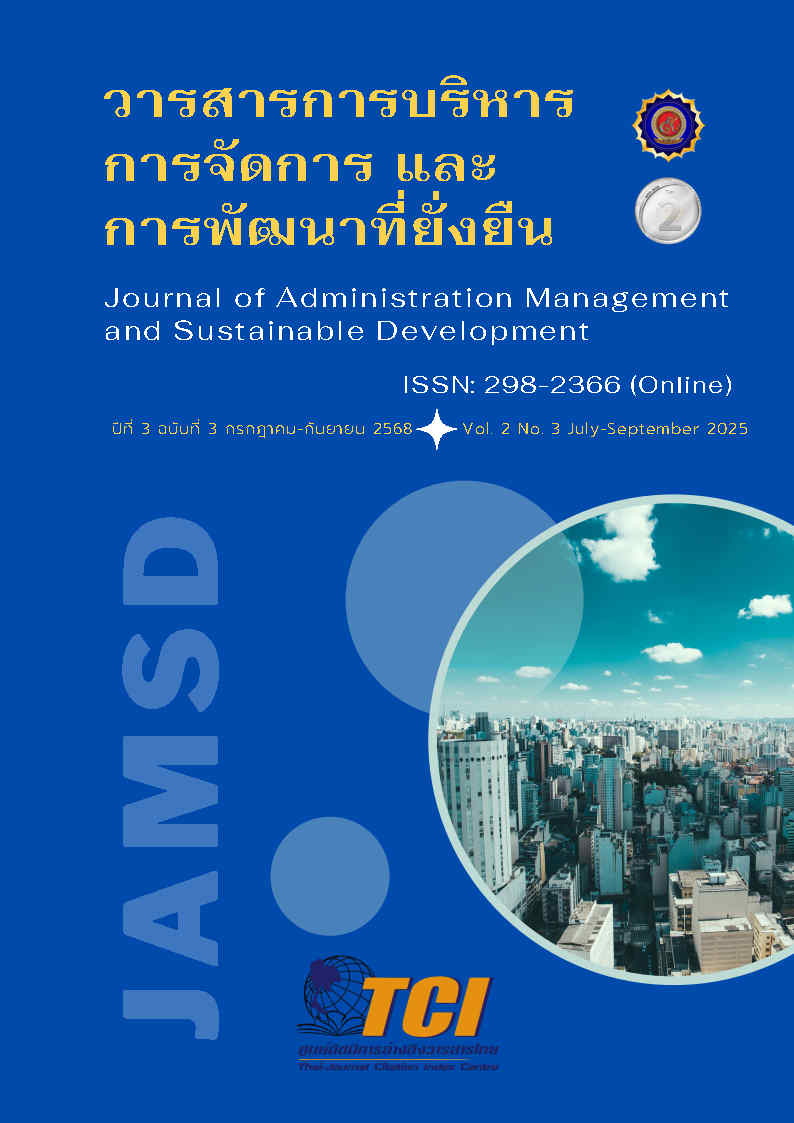Causal factors related to Buddhist holistic well-being of undergraduate students at Mahachulalongkornrajavidyalaya University
Keywords:
Buddhist holistic health, achievement motivation, dhamma practice, psychological well-beingAbstract
This study aimed to 1. examine the level of Buddhist holistic health among undergraduate students, 2. compare causal factors associated with Buddhist holistic health, and 3. validate a development model of Buddhist holistic health for undergraduate students at Mahachulalongkornrajavidyalaya University. A mixed-methods research design was employed, comprising quantitative research using questionnaires administered to a sample of 327 participants and qualitative research using an expert connoisseurship seminar with five experts. The quantitative findings revealed that students had a high level of Buddhist holistic health (mean = 3.88), with the highest mean score in the social dimension (mean = 3.93) and the lowest in the wisdom dimension (mean = 3.85). Likewise, the overall level of psychological well-being across six dimensions was also high (mean = 4.00), particularly in personal growth and purpose in life, both with the highest mean score (mean = 4.05). Group comparisons showed that Thai students had significantly higher levels of Buddhist holistic health than international students, and senior-year students had noticeably higher levels than first-year students. Causal analysis further revealed that “achievement motivation” and “foundation of Buddhist practice” were key predictors of Buddhist holistic health. Multiple regression analysis indicated that achievement motivation (β = 0.541) and foundation of Buddhist practice (β = 0.375) together accounted for 73.5% of the variance in overall Buddhist holistic health. The expert validation of the BAH-MCU Model confirmed its clarity, appropriateness, and practical applicability. The model integrates core Buddhist principles, such as the Threefold Training (Sikkhā) and the Four Foundations of Mindfulness (Bhāvanā), with concepts from positive psychology to holistically promote well-being in four dimensions physical, social, mental, and wisdom in a balanced and sustainable manner.
References
พระพรหมคุณาภรณ์ (ป.อ. ปยุตฺโต). (2559). พุทธธรรม: ฉบับปรับขยาย (พิมพ์ครั้งที่ 45). กรุงเทพฯ: สหธรรมิก.
พระเพชรเกสร ชมภูบุตร, ประยูร สุยะใจ และกมลาศ ภูวชนาธิพงศ์. (2567). แนวทางการเสริมสร้างสุขภาวะตามหลักพุทธจิตวิทยา สำหรับนิสิตระดับปริญญาตรีของมหาวิทยาลัยมหาจุฬาลงกรณราชวิทยาลัย. วารสาร มจร อุบลปริทรรศน์, 9(2), 1781-1792. https://so06.tci-thaijo.org/index.php/mcjou/article/view/274926.
พระมหาทวีศักดิ์ รัตนกมล และธีรพัฒน์ วงศ์คุ้มสิน. (2559). สุขภาพจิตแนวพุทธของนิสิต มหาวิทยาลัยมหาจุฬาลงกรณราชวิทยาลัย. วารสารสันติศึกษาปริทรรศน์ มจร, 4(2), 232–244.
ภมรพรรณ์ ยุระยาตร์, ฐาปนี สีเฉลียว และกฤตยชญ์ ไชยคำภา. (2565). การศึกษาสุขภาวะทางจิตของนิสิตมหาวิทยาลัยมหาสารคาม. วารสารบัณฑิตศึกษา มหาวิทยาลัยราชภัฏวไลยอลงกรณ์ ในพระบรมราชูปถัมภ์, 16(2), 192-208.
วุฒิชัย อุทธา, สิริวัฒน์ ศรีเครือดง และกมลาศ ภูวชนาธิพงศ์. (2567). โมเดลสมการโครงสร้างของการจัดการสุขภาวะพระสงฆ์ไทยวิถีใหม่ตามแนวพุทธจิตวิทยา. วารสารพุทธจิตวิทยา, 9(2), 283–300.
สมเด็จพระพุทธโฆษาจารย์ (ป. อ. ปยุตฺโต). (2562). พุทธธรรม (ฉบับปรับขยาย). กรุงเทพฯ: โรงพิมพ์มหามกุฏราชวิทยาลัย
สมเด็จพระพุทธโฆษาจารย์ (ป. อ. ปยุตฺโต). (2566). ปฏิบัติธรรมให้ถูกทาง (พิมพ์ครั้งที่ 144). นครปฐม: วัดญาณเวศกวัน.
Bandura, A. (1977). Social learning theory. Englewood Cliffs, NJ: Prentice-Hall.
Bandura, A. (1997). Self-efficacy: The exercise of control. New York, NY: W.H. Freeman.
Best, J. W., & Kahn, J. V. (2006). Research in education (10th ed.). Boston, MA: Pearson Education.
Blumer, H. (1969). Symbolic interactionism: Perspective and method. Englewood Cliffs, NJ: Prentice-Hall.
Creswell, J. W. (2013). Research design: Qualitative, quantitative, and mixed methods approach (4th ed.). SAGE Publications.
Eisner, E. W. (2017). The enlightened eye: Qualitative inquiry and the enhancement of educational practice (2nd ed.). Teachers College Press.
Reangsing, C., Moonpanane, K., Pittchalard, K., & Schneider, J. K. (2024). Efficacy of a Mind Space Application intervention on psychological outcomes in Thai university students with depression: A pilot randomized controlled trial. Journal of Affective Disorders, 362, 317–322. https://doi.org/10.1016/j.jad.2024.07.006.
Bukhari, S. A. R. (2021). Sample Size Determination Using Krejcie and Morgan Table. Research Gate. http://dx.doi.org/10.13140/RG.2.2.11445.19687.






